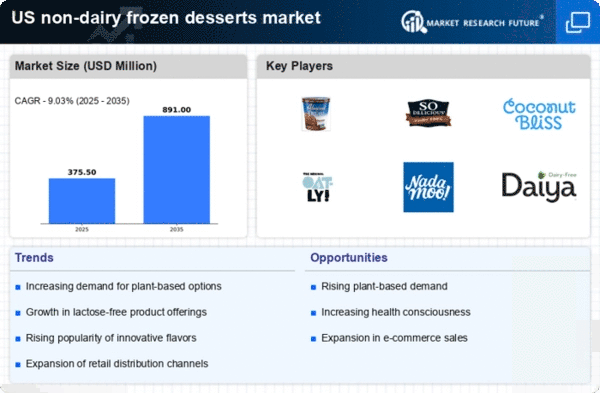Health and Wellness Trends
The growing emphasis on health and wellness significantly influences consumer choices within the non dairy-frozen-desserts market. As individuals prioritize healthier lifestyles, they are more inclined to seek out desserts that align with their nutritional goals. A 2025 report indicates that 65% of consumers are actively looking for low-calorie, low-sugar, and nutrient-dense dessert options. This trend encourages manufacturers to reformulate existing products and develop new offerings that cater to health-conscious consumers. The non dairy-frozen-desserts market is adapting by incorporating functional ingredients, such as probiotics and plant-based proteins, into their products. This focus on health not only attracts a broader audience but also positions non dairy desserts as a viable alternative to traditional options, thereby enhancing market growth.
Innovative Product Development
Innovation plays a crucial role in shaping the non dairy-frozen-desserts market. Companies are increasingly investing in research and development to create unique and appealing products that meet consumer preferences. For instance, the introduction of non dairy ice creams made from almond, coconut, and oat bases has gained traction, with sales in this segment growing by 25% in the last year alone. This trend indicates a strong consumer appetite for novel flavors and textures, prompting brands to experiment with ingredients and formulations. The non dairy-frozen-desserts market is witnessing a surge in creative combinations, such as incorporating superfoods and exotic flavors, which not only enhance taste but also appeal to health-conscious consumers. As a result, the market is likely to see continued growth driven by innovative product offerings that resonate with diverse consumer tastes.
Rising Veganism and Plant-Based Diets
The increasing adoption of veganism and plant-based diets significantly influences the non dairy-frozen-desserts market. As consumers become more health-conscious, they seek alternatives to traditional dairy products. This shift is reflected in a 2025 survey indicating that approximately 30% of Americans identify as vegan or vegetarian, a notable increase from previous years. The non dairy-frozen-desserts market is poised to benefit from this trend, as consumers actively search for indulgent yet plant-based dessert options. Moreover, the rise in lactose intolerance awareness further propels demand for non dairy alternatives, as individuals seek products that align with their dietary restrictions. Consequently, manufacturers are innovating to create diverse offerings that cater to this growing demographic, ensuring that the non dairy-frozen-desserts market remains competitive and relevant.
Sustainability and Ethical Consumption
Sustainability concerns are increasingly shaping consumer preferences in the non dairy-frozen-desserts market. As awareness of environmental issues grows, consumers are more inclined to choose products that align with their values regarding sustainability and ethical sourcing. A 2025 survey reveals that 70% of consumers consider environmental impact when making purchasing decisions. This trend has prompted brands to adopt eco-friendly practices, such as using sustainable packaging and sourcing ingredients responsibly. The non dairy-frozen-desserts market is responding by highlighting these initiatives in their marketing strategies, appealing to environmentally conscious consumers. As a result, products that emphasize sustainability are likely to gain traction, further driving growth in the market as consumers seek to make choices that reflect their commitment to the planet.
Increased Availability in Retail Channels
The expansion of retail channels significantly impacts the non dairy-frozen-desserts market. With the rise of e-commerce and the growing presence of specialty grocery stores, consumers have greater access to a variety of non dairy dessert options. Data from 2025 indicates that sales through online platforms have increased by 40%, reflecting a shift in shopping habits. This accessibility allows consumers to explore and purchase non dairy-frozen desserts that may not be available in traditional supermarkets. Additionally, major retailers are increasingly dedicating shelf space to non dairy products, recognizing the demand for these alternatives. The non dairy-frozen-desserts market benefits from this trend, as increased visibility and availability lead to higher sales and brand recognition, ultimately fostering a more competitive landscape.






















Leave a Comment